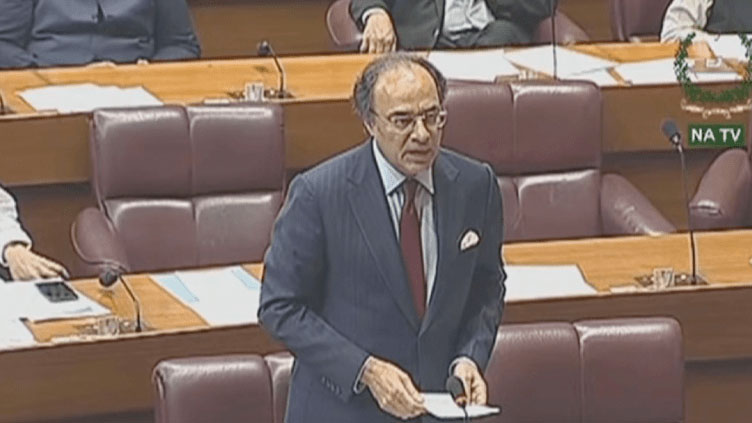- Web Desk
- Feb 19, 2026
Pakistan passes tax-laden budget ahead of fresh IMF loan
-

- Reuters
- Jun 28, 2024

ISLAMABAD:
Pakistan’s National Assembly on Friday passed the government’s tax heavy finance bill for the coming fiscal year amid an annual inflation projection of up to 13.5 per cent for June.
The bill comes ahead of more talks with the IMF for a loan of $6 billion to $8 billion to avert a debt default for Pakistan, the slowest growing economy in South Asia.
As the parliament moved to pass the bill clause by clause, Pakistan’s sovereign dollar bonds slid on Friday, Tradeweb data showed, with the 2031 maturity shedding 1.4 cents to trade at 78.69 cents on the dollar.
Finance Minister Muhammad Aurangzeb moved the finance bill in parliament, which was opened to seek amendments and debate by the ruling alliance led by Prime Minster Shehbaz Sharif and its opposition.
Speaker Sardar Ayaz Sadiq announced passing of the budget in a live TV telecast.
The government presented the national budget on June 12 with a challenging tax revenue target of 13 trillion rupees ($46.66 billion) for the year starting July 1, up about 40 per cent from the current year, to strengthen the case for a new rescue deal with the International Monetary Fund (IMF).
The budget is gearing the country towards an era of sustainable and inclusive growth, said a finance ministry report issued on Friday, which projected annual consumer price inflation for June 2024 between 12.5 per cent to 13.5 per cent, up from 11.8 per cent in May.
“The government was implementing various administrative, policy and relief measures to control inflationary pressures,” the report said.
The rise in the tax target is made up of a 48 per cent increase in direct taxes and a 35% hike in indirect taxes over revised estimates of the current year. Non-tax revenue, including petroleum levies, is seen increasing by 64 per cent.
The tax would increase to 18 per cent on textile and leather products as well as mobile phones besides a hike in the tax on capital gains from real estate.
Workers will also get hit with more direct tax on income.
Opposition parties, mainly parliamentarians backed by the jailed former prime minister Imran Khan, have rejected the budget, saying it will be highly inflationary.
Pakistan has projected a sharp drop in its fiscal deficit for the new financial year to 5.9 per cent of gross domestic product (GDP), from an upwardly revised estimate of 7.4 per cent for the current year.
Pakistan’s central bank has also warned of possible inflationary effects from the budget, saying limited progress in structural reforms to broaden the tax base meant increased revenue must come from hiking taxes.
The upcoming year’s growth target has been set at 3.6 per cent with inflation projected at 12 per cent.
Maryam Nawaz vows to defeat opposition through her performance
NATIONAL ASSEMBLY SESSION
Meanwhile, the National Assembly debated the budget for approval and rejected all the amendments suggested by the opposition. The PPP, in the meanwhile, withdrew its demand for reduction in the petroleum development levy (PDL).
The opposition demanded a vote against the increase in the PDL and its resolution was rejected by 170-84. However, the finance minister himself withdrew increase in the PDL.
PTI Chairman Barrister Gohar Ali Khan and former speaker Asad Qaiser raised the cut in funding of projects in Khyber Pakhtunkhwa.
Sunni Ittehad Council member Junaid Akbar Khan said that Prime Minister Shehbaz has said that he had been in jail like the PTI founder.
He addressed the premier and said when his party would come into power, it would pay them back along with interest. Be mindful of what you have done with our women workers, he warned the PM.
Prime Minister Shehbaz Sharif, PPP Chairman Bilawal Bhutto Zardari and Aseefa Bhutto Zardari also attended the assembly session.




